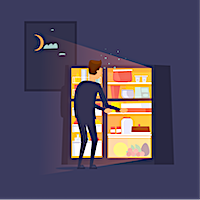By Cecilia Kwan, PhD, RD
Postdoctoral Research Associate, Smith Lab, UNC NRI
Many people are concerned with maintaining a healthy weight and look for special food rules to help guide them. But sometimes these rules turn out to be more myth than fact. When to eat is one of them. You might hear “don’t snack right before bed”, or “eat only between the hours of 11 AM and 7 PM”. Is the time we eat really important when it comes to things like gaining weight and staying healthy?
Body weight is determined by the number of calories we take in and the number of calories we expend. We obtain calories from the foods we eat, such as burgers, pizza, fruit and vegetables, as well as from the fluids we drink, such as fruit juice, soda and alcoholic beverages. We expend calories when we do household chores, such as vacuuming our house and doing yard work, or when we do exercises, such as running and dancing. Although we may not know it, our body also uses calories to perform many functions necessary for our survival. These functions include breathing, digesting foods, and absorbing nutrients.
If the number of calories we take in from our foods and fluids is roughly the same as the number of calories we expend, we are in a “calorie neutral” or “calorie balance” state, and our body weight will stay the same. If the number of calories we take in is more than we expend, we are in a “calorie surplus” state, and we will have weight gain. On the other hand, if the number of calories we take in is less than we expend, we are in a “calorie deficit” state, and we will have weight loss. It is this relationship between calories in and calories out that ultimately affects our body weight. Dietitians call this the “principle of calorie-in/calorie-out for weight control.” Therefore, it does not matter what time of the day we eat, because a calorie is a calorie and is always the same whether it is early in the day or late at night.
But research studies do find that people who eat late at night tend to put on more body weight. Why is this? Several reasons can explain these research findings. People who eat late at night usually choose foods such as potato chips, cookies, cake, soda, or ice cream. These foods are unhealthy because they are high in calories but have low nutritional value. They also eat these foods when they are watching TV or playing computer games or browsing the Internet. Because they are distracted by the screen, they can easily finish an entire bag of food before they realize how much they have eaten. This is what dietitians call “mindless eating.” Sometimes, people who eat late at night usually have already eaten dinner and are not hungry but eat because they are bored. This is what dietitians call “emotional eating.”
How can we deal with these problems? First, ask yourself this simple but very important question: “Am I truly hungry?” It is important to distinguish our hunger from our emotions and follow our body’s hunger cues. If we are truly hungry, it is okay to eat a snack. In fact, it will be a good idea to eat now rather than waiting for too long before we eat because we will likely eat more if we go hungry for a long time. Choose foods that are low in calories but come with lots of good nutrients. Good options are carrot and celery sticks with hummus, apple slices with peanut butter, mixed berry fruit salad, or low-fat plain yogurt. It is tempting to eat the leftover pizza in the fridge or a big bowl of sugary cereal, but these are not good choices. Pizza is too greasy and eating greasy or spicy foods late at night can increase the chance of indigestion. Sugary cereals do not have a high-fiber content, so they do not satisfy our hunger for long before we feel hungry and have to eat again.
To avoid overeating, foods should be portioned into smaller dishes. You can also choose from the many different pre-packaged, portion-controlled snacks available in the grocery store, such as snack bars, nut packs, or whole grain popcorn. When you eat, turn the TV off and stop playing on the computer so that you can give your foods your undivided attention.
After you eat, do not go to bed and lie down immediately. Doing so can cause heartburn, abdominal pain, nausea, or other uncomfortable problems associated with indigestion. Instead, go for a walk. This also helps expend the calories taken in from the snack. For some of us, tiredness makes us want to eat foods, especially foods that are high in calories. This is because our tiredness changes our body metabolism and hormones that control our hunger and appetite. Therefore, getting enough sleep is important and will help with managing late-night eating as well.
The bottom line is that we do not gain weight simply because we eat late at night. Making good food choices, staying mindful of our snacking habits, listening to our body’s hunger cues, and staying physically active to keep our body in a “calorie balance” state will help with maintaining a healthy weight.

